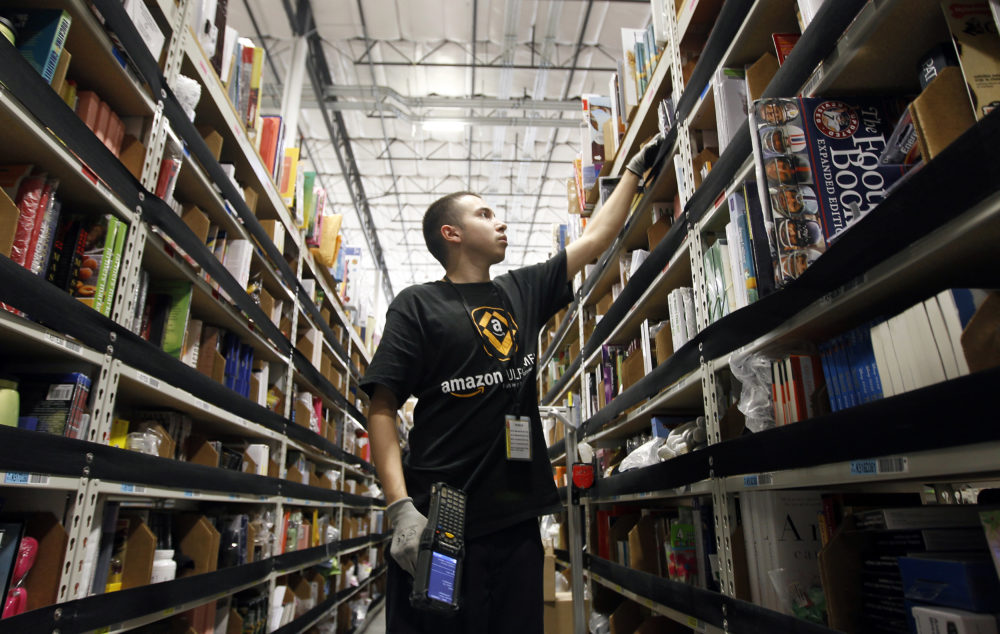As progressive as some of us pretend to be, none of us likes paying taxes, and we often embrace the old Russell Long dictum: “Don’t tax you, don’t tax me, tax that fellow behind the tree.”
Still, most of us will admit that, all things being equal, we prefer our taxes to be fair.
And what could be less fair than forcing some merchants to collect local sales taxes, thereby functionally raising their prices, while allowing other merchants to sell the same items without collecting sales taxes, thereby giving them a competitive edge?
Especially when that competitive edge disadvantages our locally based merchants (who provide jobs in our community and tax revenue to our state and local governments) and has the effect of shipping those jobs to another state.
Currently, brick-and mortar-businesses in New York State must collect state (and local) sales taxes from their customers. Online merchants based in NY must also collect state sales tax from their NY customers. Further, online marketplaces like Ebay and Amazon must collect state sales tax on transactions involving NY residents and NY merchants and other sellers.
Cuomo’s Proposal
A proposal by Governor Cuomo would up the ante and require online marketplace providers like Ebay and Amazon who do major amounts of business in the state (a minimum of $100 million a year) to collect NY sales taxes on behalf of merchants using their platforms who sell goods to NY residents, regardless whether the merchants are based in NY. The Cuomo administration estimates the change could bring in about $200 million in new state revenue over the next two years.
We might not like paying taxes we’ve avoided paying in the past, but Cuomo’s proposal would put all merchants selling to NY residents on a relatively equal footing. The effect would be to reduce NY state tax avoidance as a factor in our shopping decisions. The result: More money and jobs staying in our local economy.
Even so, you would naturally expect some legislators to oppose this, because tax avoidance is popular and tax compliance is not.
But you would at least expect them to have the decency not to claim that such a proposal would hurt the local merchants this proposal would actually help.

A worker gathers items for delivery from the warehouse floor at an Amazon distribution center (Photo by Ralph D. Freso/Reuters)
However, we are living in the age of Orwellian Newspeak, as our local Assembly members have now proven. The Daily News reported that the Brooklyn delegation to the State Assembly has recently released a letter it has sent to Assembly Speaker Carl Heastie, asking that the Assembly oppose the Governor’s proposal:
“The online marketplace has been a successful business model since the 1990’s [sic] connecting buyers and sellers for a small fee…” The letter points out that among the businesses is the Brooklyn-based Etsy, and that Amazon also has a warehouse in Brooklyn. Such businesses “have created much-needed jobs, tax revenue, and economic development opportunities throughout our state.”
But we are told the governor’s plan would set a “dangerous precedent for shifting regulatory and tax compliance from business owners to the platforms that host them” and put New York businesses at a competitive disadvantage. “We need to promote tech companies, not create regulatory liabilities.”
To which I must call baloney.
How It Really Works
If the plan somehow made online marketplaces collect NY sales tax on purchases by out-of-state buyers from merchants in NY, that would indeed put NY companies at a competitive disadvantage. It would be a highly counterproductive form of revenue collection.
But that is not what the Governor’s proposal does.
The Governor’s proposal actually helps NY companies, both brick and motor and web-based, by removing the perverse incentive for NY residents to buy online from out-of-state merchants to avoid NY sales tax.
And it creates no special disadvantage to NY-based internet marketplaces. The collection requirements would be the same for such marketplaces, whether they are based in Brooklyn or Boise.
So I have to wonder why these legislators are so concerned about a non-existent threat to NY-based internet marketplaces, but show no interest in the real concerns of the brick-and-mortar stores in their districts, many of whom are being driven out of business by those marketplaces. There will be heavy lobbying in this policy battle. Amazon and Ebay intend to put the full weight of their purchasing power to work stopping what amounts in their business to an administrative inconvenience. The longer-entrenched Retail Council, which represents merchants large and small, supports the Cuomo proposal. But in contrast to the internet giants, who could weather this additional burden, for smaller retailers it could be a matter of life and death.
So, why the letter from Brooklyn pols? It may come down to a saying by another famous politician, Tip O’Neill, about all politics being local.

Etsy is situated in the Dumbo offshoot dubbed Dumbo Heights (Photo by Andrew Hetherington/Redux)
Etsy is situated in Dumbo, right next to the district of Brooklyn Delegation Leader Joe Lentol, who represents much of Williamsburg, Greenpoint and the Navy Yard. It would only be natural for Lentol to see Etsy’s desires to coincide with what’s best for his district. And the rest of the delegation, some of whom certainly have constituents working for Etsy near Lentol’s district, are naturally inclined to go along with what is perceived as being helpful to a big local business. In addition, some Assembly members aren’t sophisticated enough for deep policy analysis, or, if they are, have more important fish to fry.
And some are sophisticated enough to see the rise of internet markets and the decline of the brick-and-mortar merchant as inevitable. Why fight the future?
Perhaps the dominance of the internet platforms will inevitably render brick-and-mortar merchants a matter of mostly historical interest.
Fine, let there be fair and free competition.
But fair and free competition means removing special advantages that out-of-state internet merchants have over brick-and-mortar stores (and our locally based internet merchants).
You would think the Brooklyn delegation would be fighting for our local merchants rather than to preserve an unfair advantage to those located out of state.
You would think wrong.